If you’ve ever wondered how to stop binge eating, this guide is for you.
Today, we’ll go over:
- What binge eating is
- Why we binge eat
- My experiences with it
- The 7 steps you need to take to stop right now
So, without further ado, let’s dive into it.
More...
My Experiences With Binge Eating
A few years ago, I was in a fat loss phase, trying to get lean for the summer. One day, I came across a forum thread with a dumbass title in the lines of “Why you should have cheat days.”
I clicked on it, read through and was convinced that, while dieting down, I should (nay, must) include cheat days two to three times per month to ‘propel’ fat-burning and improve diet adherence.
(A part of me knew that it wasn’t the case, but my hedonistic side told me to shut up and enjoy the moment. I reasoned that one day of overeating couldn’t do any harm.)
Then, on Friday after work, I hit up the local grocery store, picked up all the crap I could lay my eyes on with the intent of having my first cheat day on the following Saturday. I was so excited; I could barely fall asleep that night. I felt like a kid before Christmas.
Next morning, got up bright and early, and began my ‘reward day.’ As expected, I ate so much food that I had to lie down on three or four different occasions. I didn’t count the calories, but I reckon it was in the 10,000-15,000 range.
I had a few more cheat days during that cut before realizing that they completely negated my fat loss efforts. I knew it from the start; I just didn’t want to believe it.
This is What We Call ‘Binge Eating’
At some point in your life, you find yourself shoving enormous amounts of food down your throat:
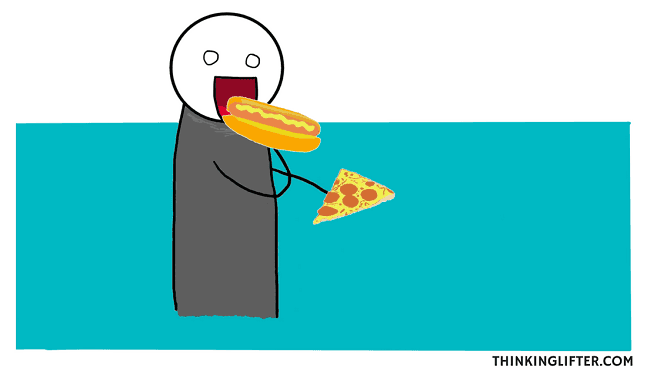
But there’s a problem: binge eating makes us come up with excuses for our behaviors:
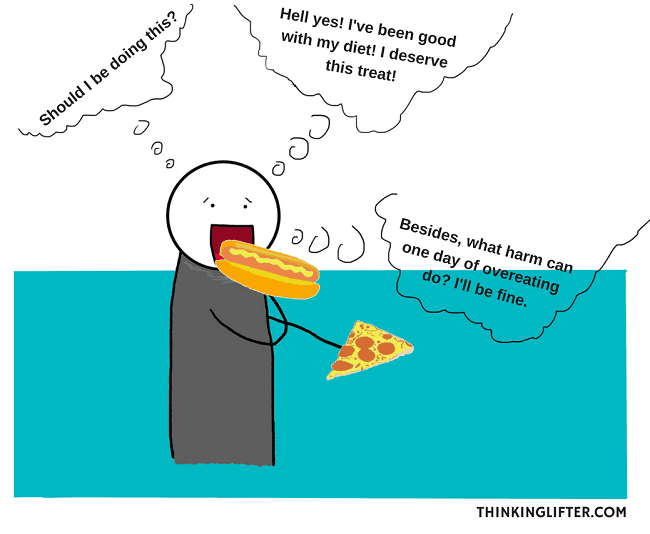
It can also lead to binge eating disorder:
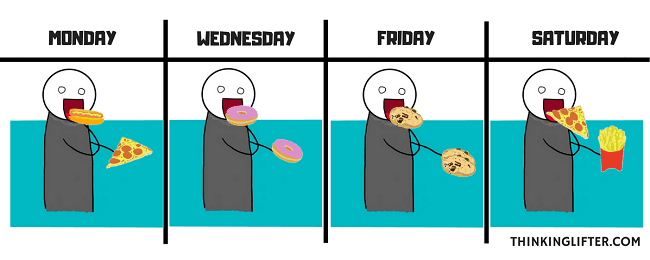
And if you reach that point, you’ll get fat.
Or you might develop bulimia and stay thin. Yay?
“Well, if this is such a self-sabotaging behavior, why do so many people do it?”
I’m glad I asked.
Why Do We Binge Eat?
In my mind, there are many different triggers for this behavior:
Strenuous diets
Perhaps the most common trigger for binge eating. Picture this:
You’ve gained more fat than you’d like, so you decide to get your act together and slim down. You go on an overly-restrictive diet and make enormous lifestyle changes in a short period:
Everything is going right, hunger and cravings aren’t much of a problem, and you’re determined to keep pushing.
But then, this overly-restrictive lifestyle creeps up on you:
You avoid social occasions because you ‘can’t drink alcohol,’ or because ‘there will be unhealthy foods there.’
You start feeling achy, tired and unmotivated to keep hitting the gym because you’d been training too much.
You start feeling starved and deprived because frankly, you’re eating 1200 calories a day and training seven days a week.
You start wondering: “What the hell am I doing?”, And “Do I REALLY want to lose weight? I’d rather eat normally again.”.
And it happens, the “Ah, screw it!” moment. You get off the diet and decide to ‘reward’ yourself with some of your favorite foods. Before you know it, you’re shoving thousands of calories down your throat, because you’re tired, unmotivated to get in shape, and HUNGRY.
And you keep repeating this behavior until you’ve undone all the progress. This is the famous “yo-yo” effect in motion.
Emotional eating
I’ll admit: I’m no expert in human emotions. But, research out there suggests that negative emotions may very well be a trigger for binge eating episodes.
Stressful life events (break-up, loss of a loved one, abuse, bullying, etc.), depression, anxiety, and anger have all been shown to be risk factors (one, two, three, four, five).Labeling foods as 'good' and 'bad'
When you label foods as either ‘good’ or ‘bad,’ healthy or unhealthy (pizza = bad, broccoli = good), you develop a black and white mentality toward nutrition.
You willingly or unwillingly cut out foods that you like from your diet because you’re afraid that you’ll get fat. And that works, for a while. But as time passes, your cravings get the better of you, and you end up bingeing on all the foods that you had previously restricted.
The truth is, foods should be labeled as more and less nutritious. That way, as long as you eat enough healthy foods, you can also allow yourself some of your favorite treats. This will keep you sane and motivated.
Look at it this way:
Say you decide today to cut out your favorite food forever because it’s ‘unhealthy.’ Now, each time you think about it, you’ll get depressed and frustrated. Realistically, how long do you think you can keep that up?
Getting into the mindset of “I’ll make up for it later.”
This directly relates to what psychologists refer to an empathy gap. This is our inability to think about future consequences because our current desires drive us.
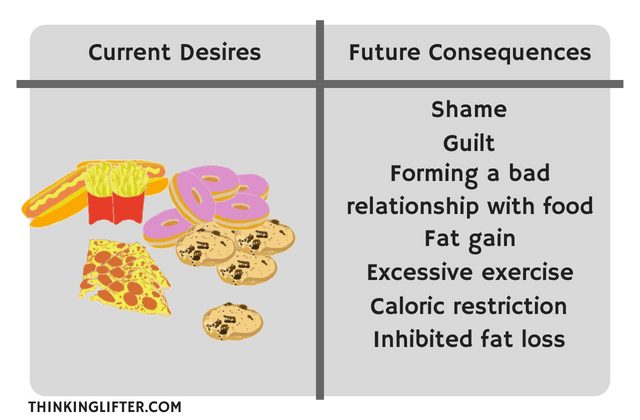
In essence, we are often really tough on our future-selves. The mindset of “I’ll make up for it later” can be really destructive as some people tend to fall in a loop of binge eating → starving + cardio → binge eating → starving + cardio...
B-but.. <insert ‘fitness’ YouTuber’s name> does 10/20k calorie challenges and he’s SHREDDED!
As humans, we are naturally drawn to calorie-dense, high-fat, high-salt foods and all we need is a bit of confirmation that ‘it’s alright’ to binge-eat. I know because I’ve been there.
I often hear people justifying this behavior with the argument that various fitness YouTubers are doing these calorie challenges and to you, I’ve got three questions:
1.If that YouTuber jumped off a bridge, would you do it too? (This question used to piss me off, but as I’ve grown, I’ve come to understand the deeper meaning of it.)
2.How do you know that this YouTuber isn’t suffering from binge eating disorder or bulimia?
3.How do you know that they aren’t feeling miserable after such a challenge by having to do excessive cardio and eat very few calories in the following days?
B-but... It’s my cheat day! I’ve earned it!
“I know! I’ll reward myself for the progress I’ve made by erasing most of the progress I’ve made!”
When I put it this way, it doesn’t sound too appealing, does it? Yet, we get in this mindset over and over again.
But look at it this way:
Say that you’re trying to lose some fat. Your maintenance calories are roughly 2,800 and you’re eating 2,300 per day to lose one pound of fat weekly (500 calorie deficit).
Now, imagine that on Sunday you have an all-out cheat day and consume 8,500 calories. So it goes like this:
Monday: 2,300 calories
Tuesday: 2,300 calories
Wednesday: 2,300 calories
Thursday: 2,300 calories
Friday: 2,300 calories
Saturday: 2,300 calories
Sunday: 8,500 calories (Hell of a “refeed day,” am I right?)
Average daily calories: 3,185 (22,300 / 7)
Whoa, wait a minute? Even though you’ve eaten in a deficit for six days, the 7th day puts you in a surplus of ~385 calories/day.
And people wonder why they’re eating in a ‘caloric deficit,’ yet gaining weight. Here’s your answer.
How to Stop Binge Eating: Punch That Ugly Disorder Right in The Mouth
Lots of things can trigger binge eating behavior. Because of that, we need to employ different tactics to break it.
(For me, to stop justifying it as my ‘well-deserved cheat day’ and to get my mind off food did the trick.)
1. Don’t go on dumbass diets. Really.
We all get a little fluffy from time to time, but you didn’t get that way in 10 days, so why do you think that fixing it in 10 days is sensible?
I know fast results sound appealing, but they don’t last. Overly-restrictive diets slowly eat at you and before you know it, you’re bingeing on leftover cake at 3 in the morning.
To achieve sustained fat loss, you need a moderate caloric deficit, flexibility to enjoy some of your favorite foods and moderate amounts of weight training. On the same note, you should be careful not to diet for too long.
You don’t need to cut out carbs after 6 pm.
You don’t need to avoid fats or sugar, because they’re ‘evil.’
And you certainly don’t need enormous amounts of cardio every day.
2. If you have emotional eating tendencies, try to do something productive instead.
As I said above, I am by no means an expert on human emotions. But, I’ve had some tendencies to binge eat during periods of high stress in the past.
What helped me most was trying to get my mind off food and do something productive with my time instead. For me, lifting weights, working on my car, and writing posts were of enormous help. For you, activities such as taking a bike ride, reading a good book, meditating, or going out with friends might do the trick.
In any case, don’t close yourself off and look to food for emotional comfort.
3. Stop labeling foods as “bad” and avoiding them at all cost, even when you know you want to eat them.
Each time I come across an article titled “7 foods to avoid if you want to lose weight” or “5 foods you won’t believe are making you fat”, all I want to do is punch the author in the face.
Here’s the thing: sure, some foods are better for us than others. But no food is inherently “good” or “bad.” They are more nutritious and less nutritious.
Stop categorizing foods as “bad,” and avoiding them at all costs, even though your mouth gets watery when you see them. Eat plenty of whole, nutritious foods and leave some of your calories for your favorite treats.
A diet you can adhere to for the rest of your life is a diet that works.
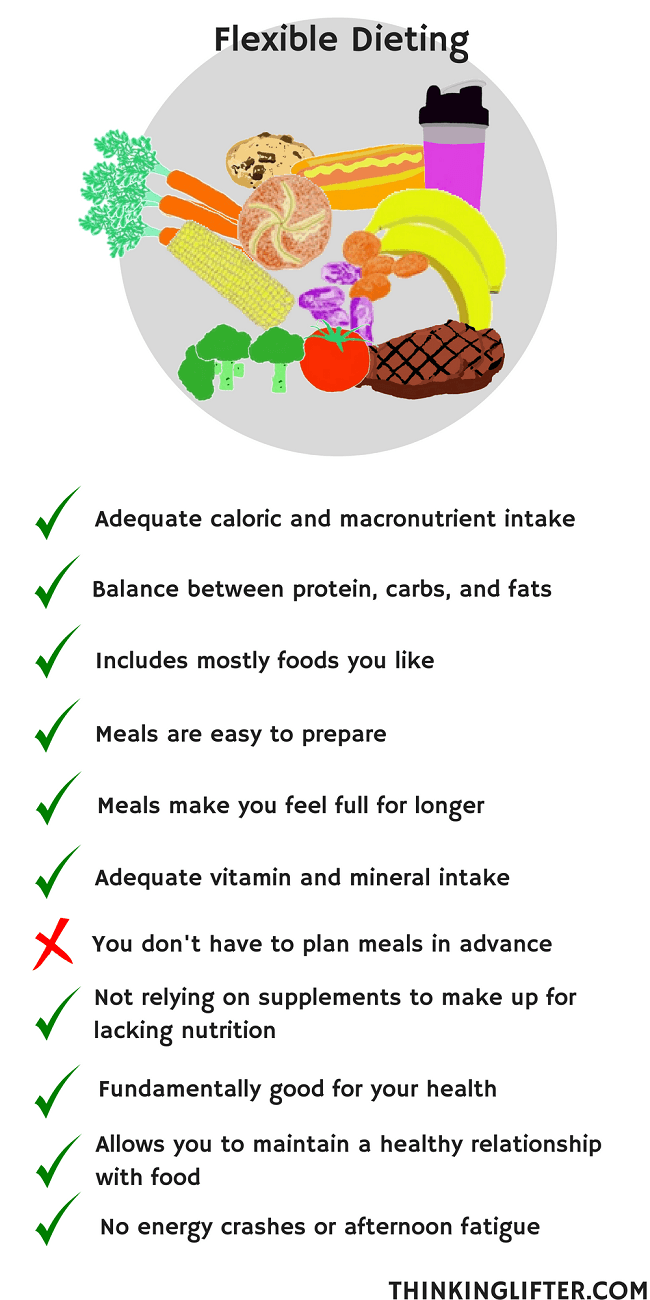
4. Stop watching these dumbass 10k calorie challenges.
Here’s a productive exercise you can do right now:
Go to the youtube homepage and see what videos show up. Are some of them “10,000 calorie challenge”, “Epic cheat day,” or “Girl vs. food”?
If there are, click the three vertical dots right next to the headline and select ‘Not interested.’ Out of sight, out of mind.
All good? Let’s move on.
5. Stop. Having. Cheat. Days.
You can try and justify them however you like, but you know you’re sabotaging yourself. I gave you an example of how a single high-calorie day can completely erase a week’s worth of progress.
If you are hell-bent on having a cheat anything, make it a meal. You’ll still get satisfaction out of it, but you won’t feel guilty and frustrated afterward.
Also, if you adhere to the 1-hour rule (meaning, your meal cannot extend over an hour, such as at a buffet), you won’t eat that many calories.
6. Remove trigger foods from your home.
Are there any particular foods that might trigger a binge eating episode? Food that gets your mouth watery just by looking at it?
Throw it out.
If you can’t get your hands on it, you are much less likely to spin out of control and binge eat. Out of sight, out of mind.
7. Be reasonable with your future self.
Remember how I said that we are often too harsh on our future selves? Well, the next time you feel the urge to binge, think about how you’ll feel afterward. Sure, stuffing yourself with junk food is pleasurable, but what happens after that?
You get bloated. You feel nauseous and tired (to the point of falling asleep in the middle of the day). Your stomach hurts (to the point where you can’t find a comfortable position for sleep). You gain a lot of body weight (admittedly, mostly water and glycogen). You feel ashamed and frustrated.
Not to mention the fact that, unless you fancy getting fat, you need to offset some of these calories. This means more cardio and less food for a few days.
Think about these consequences. Are they worth it? It took me a while to set my priorities straight, but for me, they are not.
It led me to a perpetual wheel-spin, not losing fat, not gaining muscle, and feeling like crap.
Taking some time to think about it makes you resist the impulse and allows you to think clearly.
Thank you for reading. You can get many more insightful and actionable ideas by joining my weekly newsletter. Every Tuesday, I send out content on various topics related to fitness, mindset, habits, and more. Over 10,000 people receive them. Enter your email address below and join the community today.
Leave a Reply